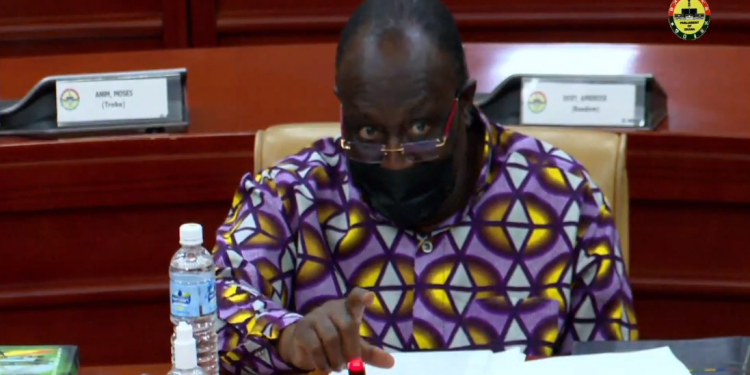Alan Kyerematen assures of an end to Ghana and Nigeria traders impasse
The Trade and Industry Minister designate has assured that the long standing impasse between Ghana and Nigerian traders will soon be a thing of the past.
The sector minister designate Alan Kwadwo Kyerematen explained that “the trade ministry in partnership with the Foreign Affairs Ministry have engaged extensively with both parties”.
The trade scuffle between Nigerians and Ghanaians has become a constant struggle between traders of the two countries over the years.
Over 600 foreign-owned shops at the Kwame Nkrumah Circle were locked up by some members of the Ghana Union of Traders (GUTA), in December 2019.
According to the association, the traders failed to produce their business operating permits.
In July 2020, some members of the Association (GUTA) clashed with Nigerian traders operating illegally at the Kwame Nkrumah Circle.
The traders closed down the shops of their Ghanaian counterparts for what they described as the “infiltration of foreigners into Ghana’s retail business.”
The Nigerian government indicated that it may head to the ECOWAS Court for redress or throw out Ghanaian traders from Nigerian markets.
But Mr Kyerematen, on Thursday reassured the house that President Nana Akufo-Addo was committed to resolving the brewing tension.
He said the two parties are believed to have agreed on a framework of engagement over the last couple of months.
Although, he did not reveal the strategies adopted, he indicated that the accepted framework is what has accounted for the calm since the last crisis in August, last year.
Mr Kyerematen was responding to a question from the Madina MP Francis Xavier Sosu regarding the tension between GUTA and Nigerian traders in Parliament on Friday.
Chronology of events over the years
On November 2, 2019, some aggrieved members of GUTA locked up the foreign owned spare parts shops of their counterparts in the Suame Magazine market.
But the timely intervention of the Suame Police command managed to avert possible clashes between GUTA taskforce members and the local group of machomen fighting for the interest of the Nigerian traders.
GUTA’s National Organiser Clement Boateng said the shops will only be reopened if their Nigerian counterparts resolve to be submissive to the association.
“At the end of the day, we may open the shops for them. If we go there this morning and they show remorse we will open it for them.
“They have to be submissive, they have to cool down but if they don’t, we will show them that we are living in our country. We want them to know that they’re in our country and they must respect our rules and regulations, he indicated.
Nigeria’s response to shop closure
In August 2020, the action of the authority, the Nigerian traders argued, was totally unfair.
“I am telling you that they have made it very clear that the Ghanaian government don’t want we [Nigerians] here in Ghana again.
“We have followed all the proper registration laid down by the government. I can tell you about five or six shops that were locked up were all abiding by the rules.
“We follow that GIPC laws, pay taxes but then they still lock our shops. The majority of these shops have the required permits from Registrar General Department, Ghana Revenue Authority, resident permits and all, so why?” an angry trader said.
It was the second time in 10 months that Nigerian shops in the Kumasi trade enclave have been closed down.
But this time it was officially sanctioned by the government, unlike the past when Ghana Union of Traders (GUTA) members closed the foreign-owned shops.
But according to them, it was a deliberate attempt to force them out of the country.
As part of tactics to get them out of the country, the Nigerians held that the government is making the resident renewal permit process difficult.
“Since November, last year till now we are finding it difficult to renew our resident permit. Whenever you send your passport to the office and they see you are a Nigerian, they just leave it there.
“Regardless of the fact that you have paid them money or not, they just leave the passport unattended to. It been over five months now,” the trader indicated.
GIPC law
Under the new GIPC Act, 2013 (Act 865), all enterprises in the country with foreign participation are required to register with the GIPC.
The minimum capital required for retail business has moved from US$300,000 to $1 million, while foreign investors who participate in joint venture enterprises have to show a minimum capital of $200,000 with wholly-owned foreign enterprises showing a minimum capital of $500,000.
Additionally, Section 28(5) of the Act stipulates that the minimum foreign capital requirements to invest in Ghana, including for engaging in trading, do not apply to the foreign spouse of a citizen of Ghana to the extent that the foreign spouse is or has been married to a citizen of Ghana for a minimum period of five years continuously or holds an indefinite resident permit prior to registration of an enterprise, amongst others.
YOU MAY ALSO BE INTERESTED IN:
* Ghana Shouldn’t Make Nigerians Pawns For 2020 Elections – Nigerian Minister
- Weak Leadership Responsible For ECOWAS Problems – Akufo-Addo
- Closure Of Nigeria Borders Irresponsible – ECOWAS Court Of Justice



